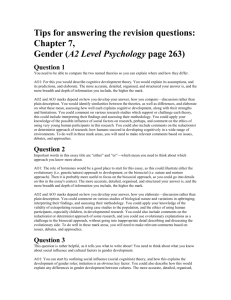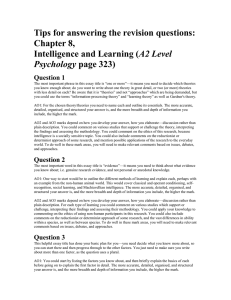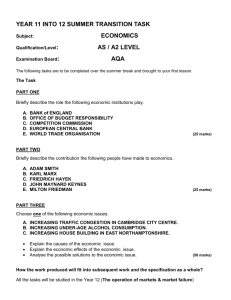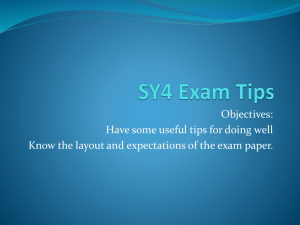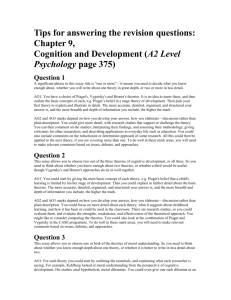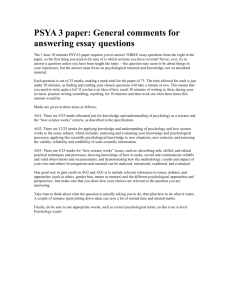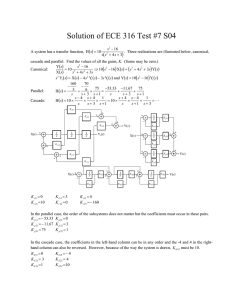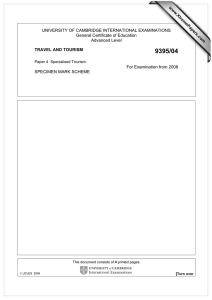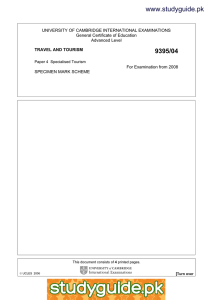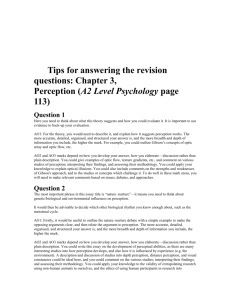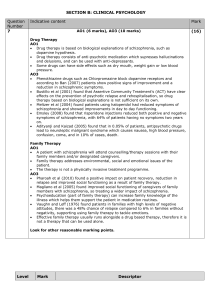Tips for answering the revision questions: Chapter 4
advertisement
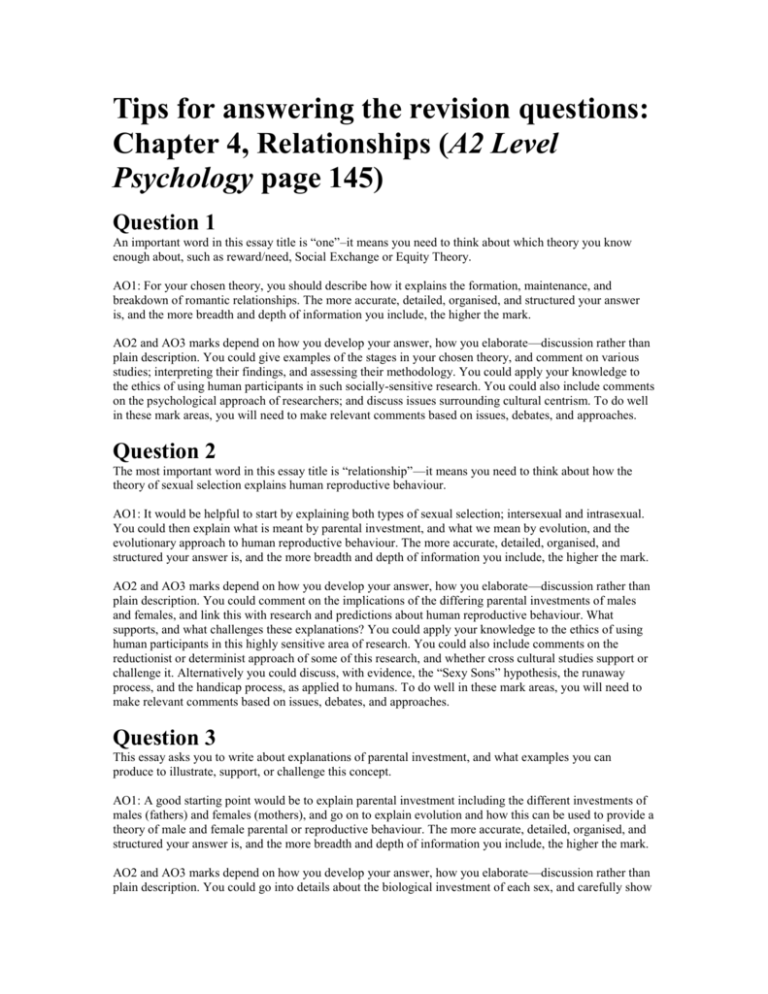
Tips for answering the revision questions: Chapter 4, Relationships (A2 Level Psychology page 145) Question 1 An important word in this essay title is “one”–it means you need to think about which theory you know enough about, such as reward/need, Social Exchange or Equity Theory. AO1: For your chosen theory, you should describe how it explains the formation, maintenance, and breakdown of romantic relationships. The more accurate, detailed, organised, and structured your answer is, and the more breadth and depth of information you include, the higher the mark. AO2 and AO3 marks depend on how you develop your answer, how you elaborate—discussion rather than plain description. You could give examples of the stages in your chosen theory, and comment on various studies; interpreting their findings, and assessing their methodology. You could apply your knowledge to the ethics of using human participants in such socially-sensitive research. You could also include comments on the psychological approach of researchers; and discuss issues surrounding cultural centrism. To do well in these mark areas, you will need to make relevant comments based on issues, debates, and approaches. Question 2 The most important word in this essay title is “relationship”—it means you need to think about how the theory of sexual selection explains human reproductive behaviour. AO1: It would be helpful to start by explaining both types of sexual selection; intersexual and intrasexual. You could then explain what is meant by parental investment, and what we mean by evolution, and the evolutionary approach to human reproductive behaviour. The more accurate, detailed, organised, and structured your answer is, and the more breadth and depth of information you include, the higher the mark. AO2 and AO3 marks depend on how you develop your answer, how you elaborate—discussion rather than plain description. You could comment on the implications of the differing parental investments of males and females, and link this with research and predictions about human reproductive behaviour. What supports, and what challenges these explanations? You could apply your knowledge to the ethics of using human participants in this highly sensitive area of research. You could also include comments on the reductionist or determinist approach of some of this research, and whether cross cultural studies support or challenge it. Alternatively you could discuss, with evidence, the “Sexy Sons” hypothesis, the runaway process, and the handicap process, as applied to humans. To do well in these mark areas, you will need to make relevant comments based on issues, debates, and approaches. Question 3 This essay asks you to write about explanations of parental investment, and what examples you can produce to illustrate, support, or challenge this concept. AO1: A good starting point would be to explain parental investment including the different investments of males (fathers) and females (mothers), and go on to explain evolution and how this can be used to provide a theory of male and female parental or reproductive behaviour. The more accurate, detailed, organised, and structured your answer is, and the more breadth and depth of information you include, the higher the mark. AO2 and AO3 marks depend on how you develop your answer, how you elaborate—discussion rather than plain description. You could go into details about the biological investment of each sex, and carefully show how this can be elaborated to explain different male and female behaviours, such as choice of partner for sex and reproduction. You could explain ideas on gamete production and how this could, in evolutionary terms, influence mating behaviour. You could also discuss the differences, both post-conception and after birth, between the male and female parent, and link this to male and female behaviours. You could also include comment on the reductionist or determinist approach of this sort of research, and the methodological and ethical problems of carrying out such extremely sensitive research. To do well in these mark areas, you will need to make relevant comments based on issues, debates, and approaches. Question 4 This essay title asks you to think about what you know about parent–child relationships in terms of research—it is important not to be influenced by personal or anecdotal experiences; this is A-level Psychology! AO1: One good starting point, remembering earlier studies perhaps, is Bowlby's theory. You could describe this, and what it predicts. You could then do the same for Freud's theory, focusing on the phallic stage. The more accurate, detailed, organised, and structured your answer is, and the more breadth and depth of information you include, the higher the mark. AO2 and AO3 marks depend on how you develop your answer, how you elaborate—discussion rather than plain description. You could comment on various studies into the consequences of childhood experiences, and biological explanations linking interpretation of autonomic arousal to emotions; interpreting their findings, and assessing their methodology, and discussing whether they support or challenge Bowlby or Freud. You could go on to discuss the Minnesota Longitudinal Study, its findings and conclusions. You could apply your knowledge to the ethics of using human participants in this socially and emotionally sensitive area. You could also include comments on the reductionist or determinist approach of the research; and how much variation there is in humans; for example how some manage to live successful adult lives and others do not, in spite of having similar childhood relationships and experiences. You must also include research into older children and adolescents, and explain how relationship experiences in this age group can stem from earlier experiences, and also influence later adult experiences. To do well in these mark areas, you will need to make relevant comments based on issues, debates, and approaches. Question 5 This essay directs you to “compare and contrast”, so you will not do well if you simply describe one theory and then go on to describe the other. You need to comment on one theory, then explain how and why it is similar to or different from the other. A good revision tip is to make a comparison table; it is difficult to think in terms of “compare and contrast” if one has not had practice. AO1: A starting point is to name your two theories and give a basic outline. For example, Social Exchange Theory has four stages based on cost–reward, whereas reward/need satisfaction theory is not a stage theory. You will gain AO1 marks for any description in your essay. AO2 and AO3 marks form the majority of the marks, and depend on how thoroughly you compare and contrast. That is, how you identify, explain, and elaborate on the theories, and explain the ways in which they are similar or different (with examples and research studies).
